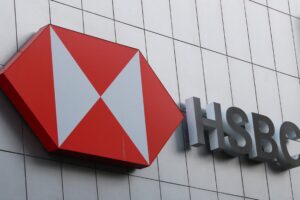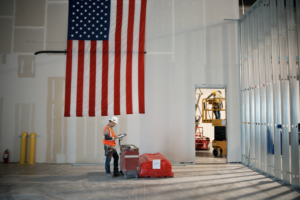<p class="canvas-atom canvas-text Mb(1.0em) Mb(0)–sm Mt(0.8em)–sm" type="text" content="Wall Street seems fixated on the wrong metrics when it comes to paper-based packaging leader WestRock (NYSE: WRK). The company continues to grow revenue and operating income, invest in technology upgrades to keep its manufacturing fleet competitive in a global market, and deliver value to customers. The stock pays an annual dividend yield of 5.3% and, unlike some peers, the business has fully funded its pension obligations. ” data-reactid=”11″>Wall Street seems fixated on the wrong metrics when it comes to paper-based packaging leader WestRock (NYSE: WRK). The company continues to grow revenue and operating income, invest in technology upgrades to keep its manufacturing fleet competitive in a global market, and deliver value to customers. The stock pays an annual dividend yield of 5.3% and, unlike some peers, the business has fully funded its pension obligations.
Despite the undeniable progress, shares of WestRock have fallen 46% since the end of 2017. The stock now trades at just 10 times expected earnings (well below the average for the peer group) and 0.74 times book value. The latter means the stock would have to rise 35% just to be valued fairly against its balance sheet.
<p class="canvas-atom canvas-text Mb(1.0em) Mb(0)–sm Mt(0.8em)–sm" type="text" content="While investors cannot discount the uncertainty surrounding the trade war between the United States and China or the rising risks of a global recession, WestRock remains a solid business trading at a great price. Here's why it's my top stock to buy in September.” data-reactid=”13″>While investors cannot discount the uncertainty surrounding the trade war between the United States and China or the rising risks of a global recession, WestRock remains a solid business trading at a great price. Here’s why it’s my top stock to buy in September.

Image source: Getty Images.
No paper tiger
<p class="canvas-atom canvas-text Mb(1.0em) Mb(0)–sm Mt(0.8em)–sm" type="text" content="Paper and cardboard likely don't top the list of attractive investment opportunities for most investors, but those with an open mind might see things differently. The North American paper-based packaging industry is mature, can source raw materials from an excess of sustainably managed forests (the United States adds forest acreage each year) and high-quality recycled fibers, and has the potential to leverage its asset base to target higher-margin opportunities global competitors cannot.” data-reactid=”27″>Paper and cardboard likely don’t top the list of attractive investment opportunities for most investors, but those with an open mind might see things differently. The North American paper-based packaging industry is mature, can source raw materials from an excess of sustainably managed forests (the United States adds forest acreage each year) and high-quality recycled fibers, and has the potential to leverage its asset base to target higher-margin opportunities global competitors cannot.
WestRock generated $1.4 billion in cash flow from operations in the first nine months of fiscal 2019 for the period ending June 30, marking a 23% increase from the year-ago period. Its fiber mix comprises two-thirds virgin material and one-third recycled material, which makes it one of the largest recyclers in the United States. And the business offers a slew of value-added solutions for customers such as on-demand, custom-sized box printing located at customer locations.
The company’s strengths may not be reflected in its share price, but they’ve been evident from the income statement, balance sheet, and cash flow statement throughout fiscal 2019.
|
Metric |
First Nine Months of Fiscal 2019 |
First Nine Months of Fiscal 2018 |
Change |
|---|---|---|---|
|
Revenue |
$13.6 billion |
$12.0 billion |
13% |
|
Gross profit |
$2.67 billion |
$2.43 billion |
10% |
|
Gross margin |
19.6% |
20.2% |
(60 basis points) |
|
Operating income |
$1.00 billion |
$764 million |
31% |
|
Operating cash flow |
$1.40 billion |
$1.13 billion |
23% |
|
Dividends per share (three quarterly payouts) |
$1.365 |
$1.29 |
6% |
|
Corrugated packaging outages |
243,000 tons |
233,000 tons |
4% |
|
Consumer packaging outages |
113,000 tons |
47,000 tons |
140% |
Data source: SEC filing.
<p class="canvas-atom canvas-text Mb(1.0em) Mb(0)–sm Mt(0.8em)–sm" type="text" content="While mill outages from maintenance projects and inventory management sapped adjusted EBITDA by $45 million compared to the year-ago period, the continuing integration of KapStone boosted adjusted EBITDA by $152 million in that span. WestRock also benefited from operating efficiency gains, as productivity increases offset inflation and wage increases and drove adjusted margins higher. ” data-reactid=”33″>While mill outages from maintenance projects and inventory management sapped adjusted EBITDA by $45 million compared to the year-ago period, the continuing integration of KapStone boosted adjusted EBITDA by $152 million in that span. WestRock also benefited from operating efficiency gains, as productivity increases offset inflation and wage increases and drove adjusted margins higher.
Additionally, the company recently achieved an important milestone: a containerboard integration rate of 80%, compared to 72% when the goal was announced in the fiscal third quarter of 2017. That simply means WestRock is manufacturing more finished cardboard boxes, which allows it to capture higher margins and gives it more control over the markets it serves. The business is now targeting a containerboard integration rate of 90% within the next few years, but that’s not the only growth opportunity ahead.

Image source: Getty Images.
An overlooked strength: value-added solutions
WestRock’s ability to manufacture value-added paper-based products for customers has the potential to drive organic growth in the near future. Those opportunities have underpinned the company’s strategic capital investment strategy in recent years, as well as the acquisition of KapStone. As a result, the business is well positioned to capitalize on several trends within the North American market that investors might not be aware of:
- On-demand box printing: WestRock’s Box on Demand Systems put a box-folding machine at customer locations. That allows them to print custom-sized boxes as orders come in to reduce waste and eliminate excess shipping fees from carriers when boxes are poorly fitted to contents. U.S. Auto Parts recently began using the solution to handle its highly variable product sizes.
- Ships In Own Container (SIOC): E-commerce leader Amazon will soon require that items measuring 18x14x8 inches or longer use SIOC certified packaging — similar to Amazon’s frustration-free packaging — or face additional fees. WestRock is working with customers to create custom solutions and capture the new market. Colgate-Palmolive is now using the solution for 28 unique products.
- Plastic replacement: A number of consumer-facing brands are eager to ditch plastic packaging and food containers for sustainable paper-based options. WestRock is now working with dozens of customers and expects to be operating at an annual run rate of $100 million in incremental revenue by the end of September 2019. The opportunity should expand as Europe and other regions enforce and strengthen single-use plastic bans in the next few years.
WestRock is able to capture these opportunities thanks to recent technology improvements across its fleet in North and South America. A handful of major maintenance and improvement projects are wrapping up, which is expected to reduce capital expenditures from $1.4 billion in fiscal 2019 to $1.1 billion in fiscal 2020. Management expects outlays to fall even further in fiscal 2021. While the projections are foggier the further out investors wander, the fact that WestRock is planning for lower capital expenditures in the next two years provides flexibility should it need to respond to an economic slowdown. The strategic investments are also expected to drive a $240 million improvement in adjusted EBITDA by the end of fiscal 2022.
A great buy for long-term investors
It’s easy to overlook investment opportunities in paper and cardboard, but the North American industry is uniquely positioned to support domestic and global growth in e-commerce sales (which require a lot of cardboard boxes) and sustainable packaging regulations (which customers increasingly demand). WestRock has wisely positioned itself to capture those opportunities, including several that aren’t necessarily so obvious to investors.
The business has formidable cash flow, a sustainable dividend, and ample growth opportunities on the horizon. While the stock could keep dropping in an economic downturn, many of the world’s best investors know that, eventually, undervalued investments return to a fair value. Considering shares of WestRock need to gain 35% from current levels just to achieve that, this dividend stock looks like a great buy this month for investors with a long-term mindset.
<p class="canvas-atom canvas-text Mb(1.0em) Mb(0)–sm Mt(0.8em)–sm" type="text" content="More From The Motley Fool” data-reactid=”61″>More From The Motley Fool
<p class="canvas-atom canvas-text Mb(1.0em) Mb(0)–sm Mt(0.8em)–sm" type="text" content="John Mackey, CEO of Whole Foods Market, an Amazon subsidiary, is a member of The Motley Fool’s board of directors. Maxx Chatsko has no position in any of the stocks mentioned. The Motley Fool owns shares of and recommends Amazon. The Motley Fool is short shares of Colgate-Palmolive. The Motley Fool recommends WestRock. The Motley Fool has a disclosure policy.” data-reactid=”69″>John Mackey, CEO of Whole Foods Market, an Amazon subsidiary, is a member of The Motley Fool’s board of directors. Maxx Chatsko has no position in any of the stocks mentioned. The Motley Fool owns shares of and recommends Amazon. The Motley Fool is short shares of Colgate-Palmolive. The Motley Fool recommends WestRock. The Motley Fool has a disclosure policy.
<p class="canvas-atom canvas-text Mb(1.0em) Mb(0)–sm Mt(0.8em)–sm" type="text" content="This article was originally published on Fool.com” data-reactid=”70″>This article was originally published on Fool.com








